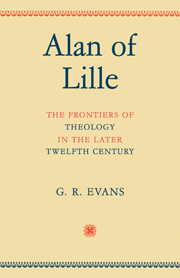Summary
alan the preacher
‘Few have said much about what preaching ought to be, whose task it is, to whom it should be addressed, what subjects it ought to cover, how and when and where’. In his Art of Preaching Alan proposes to repair this deficiency in two ways: firstly he tries to answer some of these questions with general advice, and, secondly, he provides the would-be preacher with a substantial body of material so that he can put the advice to practical use.
Was he right in thinking that such a handbook was needed? In general he seems to have had an eye for a gap in the literature of any subject which he himself was competent to fill, and this seems to have been no exception. In Paris in the late twelfth century the preaching of sermons became something of a fashion among academics. As it had been in the days of Jerome and Augustine, the sermon was seen as a form of exposition of Scripture. At the beginning of his Verbum Abbreviatum Peter the Chanter describes the laying of foundations by lectio; the building of the walls by disputatio and the construction of the roof by predicatio. An additional spur was the need for missionary preaching against the heretics in the south of France and elsewhere, which was felt with increasing pressure as the twelfth century wore on.
How were these new preachers to learn their business? One way was certainly by imitation. The homilies of the Fathers had for centuries provided all that was needed for reading to members of monastic communities.
- Type
- Chapter
- Information
- Alan of LilleThe Frontiers of Theology in the Later Twelfth Century, pp. 87 - 101Publisher: Cambridge University PressPrint publication year: 1983



